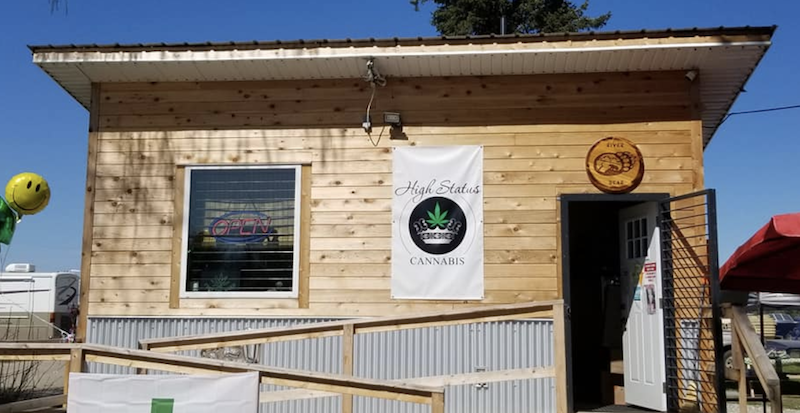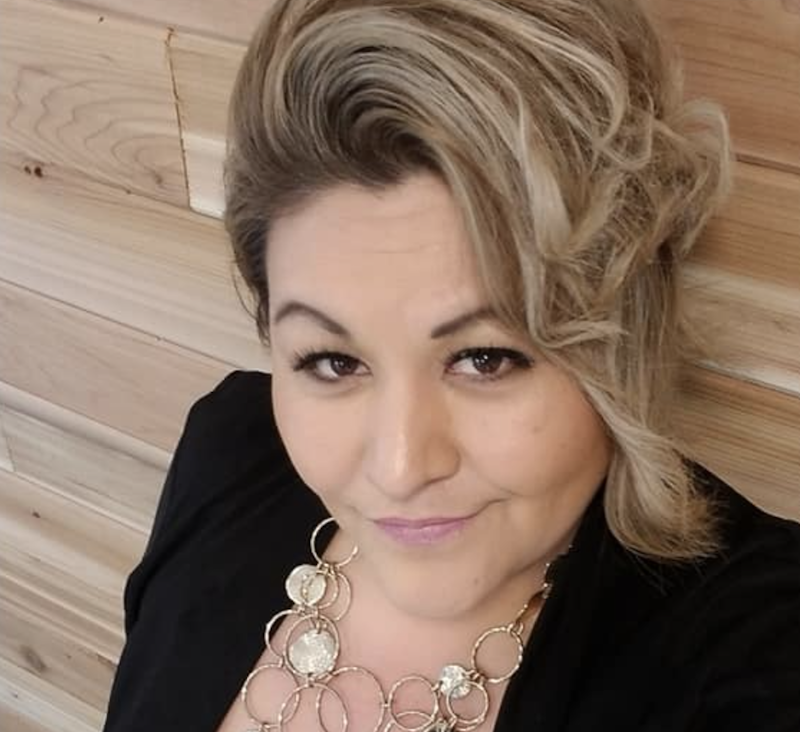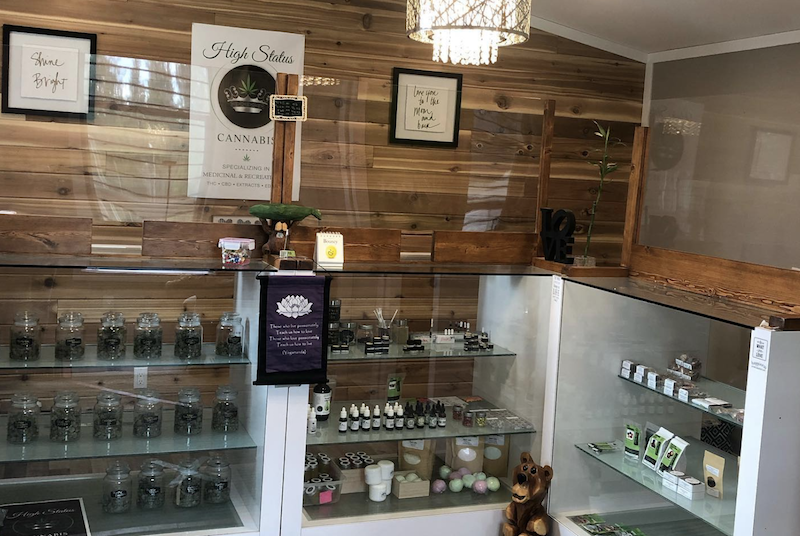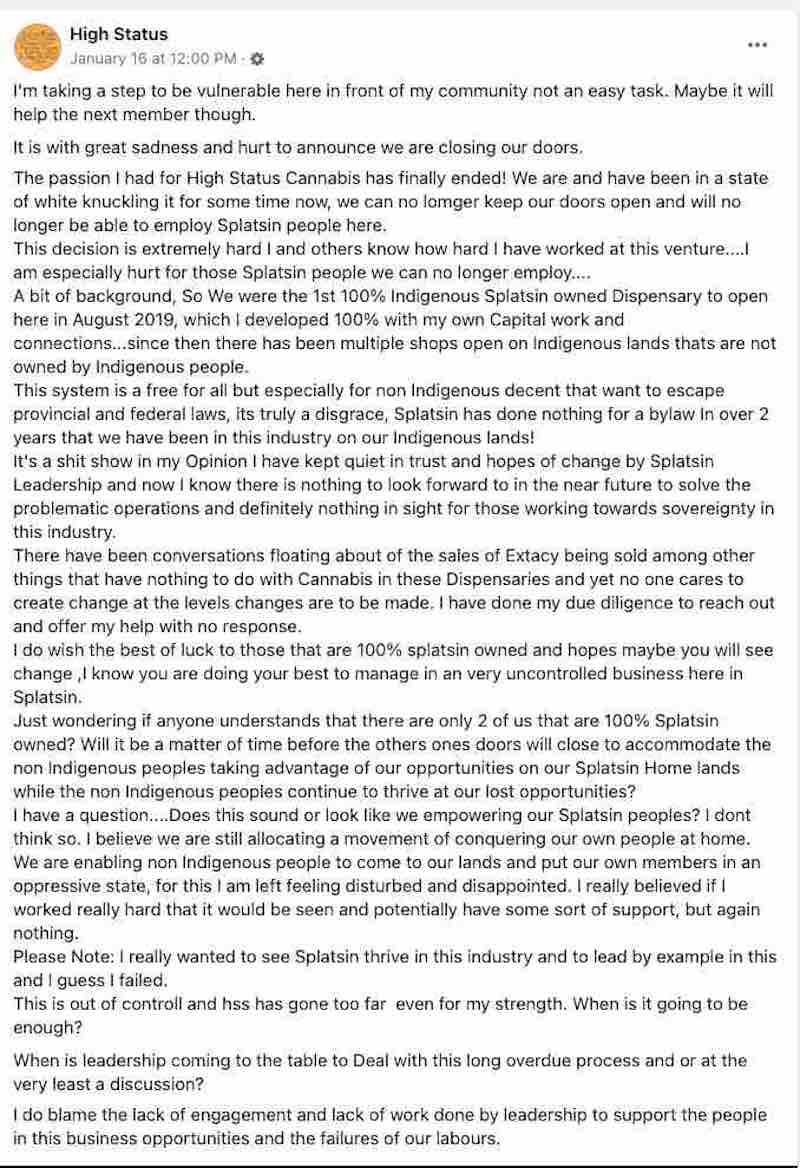Features
Q&A with High Status cannabis store owner
Published on January 28, 2022 by David Wylie

We talked to High Status Cannabis store owner River Johnson.
The Splatsin woman is shutting down her cannabis shop because there are about a dozen stores operating on Splatsin land in the North Okanagan—all without a licence from the province.
Johnson says her store, which is also unlicensed, will close Feb. 28.
Several news outlets spoke to Johnson after she posted on social media about the challenges her store was facing; read more on InfoNews, Castanet, Black Press, and Stratcann. We reached Johnson earlier this week and she conferenced the oz. into a phone interview already in progress with another reporter.
Below is our mostly unfiltered Q&A with Johnson. (We cut a small section because she expressed concerns for her safety over some information disclosed.)
River — What’s happening here is we have non-indigenous people flooding to the reserves. There’s like the colonial system, here’s some whiskey for extortion of your land, your rights, whatever, your women. This time it’s pot.
Reporter — Do you feel like the door’s been opened and the band hasn’t regulated it enough?
Exactly. They haven’t.… This is about having to shut down a business that employs Splatsin members. We have an opportunity to pull ourselves out of poverty, to empower our people and ourselves, and to be sovereign. Maybe to build ourselves homes, to fix our roofs, home repairs we need without having to turn to the band to do those things. The money’s not there anyway, so here we are.
I’m a business owner of two different businesses and I’ve decided to shut my doors because I’m not making any money. I can barely keep people employed. I’m literally paying for wages and barely product even at this point. I’m frustrated. When you see $90 days at the end of a day and there’s 12 dispensaries in the area with a population of 2,965 people… Kelowna doesn’t have 12 Lululemons.
There’s four of them (cannabis stores) around the daycare. How can you even do this? Why is there nothing being done to protect the kids from the criminal element. You don’t plant beer stores and bars right beside the school. There’s no proactive regulations or guidelines to operate on reserve and we have non-indigenous people taking advantage of those rights. They don’t have to even go to the band to apply for a licence or a permit.
The other bands around us, the Tk’emlúps and Okanagan Indian Band, within months had bylaws in place, and not only did they have bylaws, they actually worked with Indigenous people in the industry on Okanagan Indian Band to create the bylaw. They’re not doing that in Splatsin. I haven’t heard any talk, I haven’t heard of it being a priority to anybody around the table.
the oz. — This isn’t just cannabis either, what’s being sold?
River — One of the things is ecstasy, that I’ve heard of. I don’t want to go into anything else because I think it’s border lining right now to legalization. Who knows what else is going to come out of these shops. If they’re getting away with doing ecstasy, they’re going to get away with the next thing.
There’s only one other shop on our reserve that’s 100% Splatsin Indigenous owned. It’s not about Indigenous owned, it’s about Splatsin owned. It should be 100% Splatsin owned. I know there’s other Indigenous shops out there that say Ok yeah we’ll partner up and do this but guess what their daddy’s a white guy.
I really felt empowered and really felt it was important to find a way to sovereignty with this industry. But this is not the way to do it obviously. I’m shutting down. I can’t hire my people.
I don’t think this is the only reserve this is happening to.
the oz. — What would you like to see when it comes to cannabis on Indigenous land?
River — This is a huge opportunity to be able to free ourselves from the chains of the government and be able to have our own source of revenue. I would like to see industry of hemp. We only have 0.2% of the Canadian land base. That’s not very much land of opportunity for Indigenous people. It’s kind of bleak if you ask me. That being said, I don’t want to see the shops done, I don’t want to see the industry done on the reserve. I want to see it managed better. I want it to be done safely so our community, our elders, our children can feel safe in our communities. We could know that we have safe consumption happening on our reserve. I still think that there’s avenues, ways in this industry that we’re not governed under the provincial and federal law because I still believe there’s a really great medicine to be offered. And you can’t say that if you’re regulated under the government, you can’t say it’s health benefit
I’d also like to see that there’d be 100% Indigenous owned shops, Splatsin owned shops, they do their work, they use their capital, they go after grants if they’re available. It would be nice to see us proactive in this industry. We weren’t really consulted. I would like to see these criminal elements off our reserves, out of our communities. I’d like to see us do it on our own. I’d like to see us make our own laws about it, as long as they are safe and efficient so that businesses like ours don’t have to shut their doors because I have to once again accommodate the non-Indigenous people on my lands now. I don’t want these guys walking through our reserve and taking our rights. It’s oppressive.
the oz. — Do you feel like there’s opportunity to coexist with licensed stores?
River — I think so. I mean, I don’t know… people know you get better product at Indigenous stores.
the oz. — Licensed stores would say the opposite.
River — Unfortunately we’re getting so many LPs that are also feeding the black market. They’re supposed to be feeding the white market, or whatever you want to call it—the regulated market. But they’re flooding right out into our shops too. And I’m sorry but it’s shitty product.
I talk to those regulated shops too. I feel bad for those mother———, man. It’s really bad what the government did. It’s so bad. They have those government stores. It’s so unfair. Who’s the real crook here? The government’s the real crook.
the oz. — Some of the private ones are struggling…
River — And it’s not because of us. I know people said if I close my doors they’re going back to their black market guy, they’re going back to their backyard guy. They don’t want to shop at any other shops. The non-Indigenous community is choked too. They said why are you closing. You were the pioneer here. And that’s not even Indigenous people—that’s non-Indigenous people.
the oz. — What is the main message that you want to get out?
River — They’re not welcome, and they’re destroying our opportunity and our industry. The leadership is a key piece of why that’s happened.
We’re not moving ahead. I’m broken hearted that I cannot hire Splatsin people anymore in my community through this industry. I would like to keep my doors open but it’s too hard to do with the market saturated like this. This is our time; this is our opportunity.
I’m a consumer myself and this was a really cool dream and passion. Now I feel like I did all that blood, sweat, tears, and fight for what? It’s gone. I tried to lead by example and do it the right way and do it the safe way, and it didn’t matter. I was the first Indigenous person to open a shop here and I wanted to do it with integrity.
—
Here is the post that started the media frenzy:
Leave a comment on our Facebook page.
© Copyright 2022 Okanagan Z. | About the oz.
Report a Typo or Inaccuracy
We strive to avoid typos and inaccuracies. However, on occasion we make mistakes. We value your contributions and help in correcting them.


